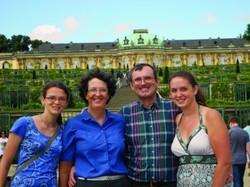There is supposedly an ancient Chinese curse, may you live in interesting times. I suppose, that for people who value security and predictability, uninteresting times are preferable, if slightly boring. Otherwise, interesting is better. No one with access to world news could possibly argue that these are not interesting times for those of us with connections in Russia and the former Soviet Union. Recent events in Ukraine and the subsequent reabsorption of the Crimean peninsula into Russia have made for constant headlines.
The nature of the headlines depends very much on which newspapers or websites you choose to read. Western sources characterize the events in Kyiv (Kiev) which led to the departure of former President Yanukovich as a Democratic reaction to his dictatorial rule. Russian news reports, on the other hand, treat the demonstrators as usurpers, financed by the West and dominated by fascists. Russian media have characterized the demonstrators as “Banderovtsy,” summoning up the ghost of Stepan Bandera, who led Ukrainian nationalists struggling against Soviet power before, during and after the second world war. For anyone educated during the period of the Soviet Union, Stepan Bandera is only slightly removed from Hitler on the scale of human depravity. Just as most of us in the West would have to search to get the Russian medias take on these events, Russians are unlikely to get the Western take without considerable effort. Most Russians get their news the same way we do, from the nightly television broadcasts.
I was in Russia from March 12 to March 23, and the Crimean referendum on rejoining Russia occurred almost exactly in the middle of my stay. The results of the referendum were never in any real doubt, and even the presence of substantial numbers of Russian soldiers are unlikely to have affected it. Historically, Crimea was a part of Russia, and remained so from the time of Catherine the great until 1954, when it was transferred to the Ukrainian Soviet Socialist Republic. This was a mere administrative change, since the Soviet Union was all one country anyway, and the substantial military bases in Crimea meant that it was governed from Moscow and not from Kyiv. The population remained overwhelmingly Russian.
Despite the feverish press coverage coming from East and West, and the overheated rhetoric coming from various political figures, I had a completely uneventful visit. In fact, on many levels, it was an unusually pleasant visit. Naturally, as a guest in Russia, it would not have been appropriate for me to get involved in gratuitous discussions about such a divisive issue. In fact, the Russians I did speak to about the issues, people with whom we have had long-term relationships, had differing viewpoints on the events in Ukraine, some in favor of their government’s actions and some opposed. As a part of my visit, I spent the better part of a week with a group of American teenagers visiting with their Russian contemporaries. All of the interactions between the two groups were open and friendly, and no one allowed politics to interfere with the visit. It occurred to me on several occasions that the young people were handling the situation rather better than the adults on the evening news.
Many of our Russian partners are concerned that the current tensions will affect the ministries which they share with American partners, and that Americans will be reluctant to come to Russia to take part in those ministries. The current situation is undeniably sub-optimal, but there is no objective reason that Americans planning a trip to visit mission partners in Russia should not follow through with those plans. In fact, it is probably more important now than ever to keep up our contacts with our Russian brothers and sisters in Christ. Ellen and I keep a very close watch on developments in Russia and are in almost constant contact with our Russian partners. With very few exceptions, wherever a group of Presbyterians may go in Russia, one of us will be going with them. None of the trips planned for this summer involve regions where it would be unwise to go. If the situation warrants a change in that assessment you can be sure that we will let you know.
Please keep the people of Russia and Ukraine, and particularly our Russian partner churches in your prayers.

